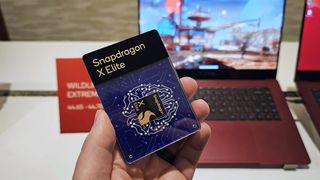Microsoft just renamed its Edge browser on iOS and Android... kind of
Microsoft has added "AI" to the name of its mobile browser.

What you need to know
- Microsoft has renamed its Edge browser on iOS and Android.
- The full name of the app is now "Microsoft Edge: AI Browser."
- Microsoft has said that it will incorporate artificial intelligence into all of its apps and services.
- The official name of SwiftKey is "Microsoft SwiftKey AI Keyboard," even though most people refer to it as just SwiftKey.
Microsoft Edge has a new name on iOS and Android, or at least an updated name in its store listings. What was once simply known as "Microsoft Edge" is now listed as "Microsoft Edge: AI browser." The change reflects a push to integrate artificial intelligence into all of Microsoft's services.
The new name isn't just a marketing tool. Microsoft Edge does have AI features built-in, as outlined by its updated App Store listing:
"Microsoft Edge, your AI-powered browser, with Copilot built in to enhance your browsing experience. Empowered by GPT-4, Copilot enables you to ask questions, refine searches, receive comprehensive summaries and create images with DALL-E 3. Microsoft Edge is a smarter way to browse, find, create and shop on the go."
The listing also shows images of the aforementioned AI features in action.
While some of those features are available on other browsers, Edge bakes them right in. A button at the bottom of Edge brings up Copilot with Bing Chat, which can do a variety of tasks and answer questions. It even has the option to use GPT-4 rather than GPT-3.5.
Marketing or a new emphasis?

I've seen some pushback about Microsoft changing the name of Edge in its listings. Some argue that Edge is not an AI browser, claiming that it is a browser with AI features. I disagree. It's not like the AI features are limited to when you open Bing or a specific site. AI is available at the push of a button and some of the AI features interact with what's on your screen, such as article summaries.
I imagine Microsoft has some AI features in the works that aren't here yet, but Edge is already an AI browser.
Get the Windows Central Newsletter
All the latest news, reviews, and guides for Windows and Xbox diehards.
Microsoft recently renamed Bing Chat to Copilot with Bing Chat. The company also brought its various Copilots under unified branding. It's clear that Microsoft CEO Satya Nadella's promise to integrate AI into all Microsoft services has continued to be a point of emphasis.
AI in 2024

Some referred to 2023 as the year of AI, and with good reason. ChatGPT hit its stride (though it launched in 2022). Bing integrated with ChatGPT. Google released Bard. Tech giants are racing to get AI into the hands of consumers and to get their APIs used by other tech companies.
Windows 12 will have even more AI experiences and features than Windows 11, which already has Copilot built in.
On the hardware side of things, NPUs are on the way in 2024. Those dedicated processors specialize in the repetitive tasks that AI requires. You can expect to see a wave of laptops and devices with NPUs, thanks in part to Intel Core Ultra processors and Qualcomm's Snapdragon X Elite featuring NPUs.
Microsoft Edge | Free at Google Play | Free at App Store
Microsoft's browser is most known for its presence on Windows, but it also has versions on iOS and Android. Microsoft recently added "AI" to store listings for Edge on mobile platforms and emphasized artificial intelligence features within the app.

Sean Endicott brings nearly a decade of experience covering Microsoft and Windows news to Windows Central. He joined our team in 2017 as an app reviewer and now heads up our day-to-day news coverage. If you have a news tip or an app to review, hit him up at sean.endicott@futurenet.com.
-
naddy69 "Tech giants are racing to get AI into the hands of consumers".Reply
Which makes me wonder why Microsoft is doing this, since businesses make up the vast majority of MS's client base.
If this stuff can't be turned off in Windows 12 Enterprise, it will flop louder and harder than Windows 8 did. No business is going to want Microsoft "AI" watching what all employees are doing and offering "suggestions" on what to do next. What could possibly go wrong with that?
This stuff HAS to be optional and should NOT be on by default. -
Steve78UK Reply
You say that but it's creeping in everywhere with surprising acceptance. Where I work the Service Desk has a chat bot that is underused but surprisingly good at resolving first line issues and even more complex problems as it pulls resolutions from previous support tickets with remarkable accuracy.naddy69 said:"Tech giants are racing to get AI into the hands of consumers".
Which makes me wonder why Microsoft is doing this, since businesses make up the vast majority of MS's client base.
If this stuff can't be turned off in Windows 12 Enterprise, it will flop louder and harder than Windows 8 did. No business is going to want Microsoft "AI" watching what all employees are doing and offering "suggestions" on what to do next. What could possibly go wrong with that?
This stuff HAS to be optional and should NOT be on by default.
It's sneaking in to all Microsoft Apps, anything from a web browser to Office 365.
If it saves time & money then businesses are going to want to use it. It goes without saying that it needs to be a cautious approach but any organisation completely nuking it from their environment are going to be the ones losing out.
It's also wrong to suggest AI is 'watching' employees. It all depends on how it's used within apps and more importantly what the user asks it to do. Querying localised data in your environment should be perfectly ok, as long as there's no transmission of sensitive and personal data back to Microsoft or whoever the vendor is for 'training' their products.
Microsoft are not going to want to anger the Enterprise so you'd think they'll be huge scope for IT Admins to enable or disable what their organisation finds acceptable in Windows 12. Assuming Windows 12 will launch late in 2024 then Microsoft really needs to get a preview out sooner rather than later so people can start playing around with it. -
HelloNNNewman Reply
Just to clarify.... Those auto-chat systems that companies use are not AI. That's like slapping the label "High Definition (HD)" on sunglasses. Those bot services are simply coding refined to guide step by step processes. Even when they pull info from previous tickets - that isn't the use of Artificial Intelligence - that's coding, tags, filters.Steve78UK said:You say that but it's creeping in everywhere with surprising acceptance. Where I work the Service Desk has a chat bot that is underused but surprisingly good at resolving first line issues and even more complex problems as it pulls resolutions from previous support tickets with remarkable accuracy.
It's sneaking in to all Microsoft Apps, anything from a web browser to Office 365.
If it saves time & money then businesses are going to want to use it. It goes without saying that it needs to be a cautious approach but any organisation completely nuking it from their environment are going to be the ones losing out.
It's also wrong to suggest AI is 'watching' employees. It all depends on how it's used within apps and more importantly what the user asks it to do. Querying localised data in your environment should be perfectly ok, as long as there's no transmission of sensitive and personal data back to Microsoft or whoever the vendor is for 'training' their products.
Microsoft are not going to want to anger the Enterprise so you'd think they'll be huge scope for IT Admins to enable or disable what their organisation finds acceptable in Windows 12. Assuming Windows 12 will launch late in 2024 then Microsoft really needs to get a preview out sooner rather than later so people can start playing around with it.
Source: we just installed a state of the art "chat" service for one of our state clients. -
Steve78UK Reply
Yeah sure, I agree but its marketed as such. Like ChatGPT is labelled by many as just a fancy search engine by some. However, the lines are blurred a little as the chat bots are intelligently providing accurate answers based on what is asked, and even presenting intelligent alternative resolutions to problems. There's machine learning involved at the very least.HelloNNNewman said:Just to clarify.... Those auto-chat systems that companies use are not AI. That's like slapping the label "High Definition (HD)" on sunglasses. Those bot services are simply coding refined to guide step by step processes. Even when they pull info from previous tickets - that isn't the use of Artificial Intelligence - that's coding, tags, filters.
Source: we just installed a state of the art "chat" service for one of our state clients. -
HelloNNNewman Reply
I get your direction, but the 'machine learning' is advanced database management. Again, there is a huge difference between database loading and actual 'machine learning'. The auto-chat systems, while they seem like they are learning as they go, are actually just using extremely elaborate (but still manually managed) filters and tags to build and extend (add to) their knowledge databases. Each call creates an 'ticket number' and walks customers through an huge "pain-in-the-*** " process (as we call it) that pulls from a database to steer the steps for that 1st level.Steve78UK said:Yeah sure, I agree but its marketed as such. Like ChatGPT is labelled by many as just a fancy search engine by some. However, the lines are blurred a little as the chat bots are intelligently providing accurate answers based on what is asked, and even presenting intelligent alternative resolutions to problems. There's machine learning involved at the very least.
When it goes to 2nd tier (human interaction), the actions taken to resolve that ticket number are filtered and tagged, and added to the process steps where possible. It is all still managed by a team to keep the service tweaked and growing... but there is no "intelligence" involved outside of human. An automatic service like this is designed to make the customer feel like they are actually talking to someone, or that the software is 'alive'. But it is all purely intentional design and constant manual programming. -
Sean Endicott Reply
Nadella has said that all Microsoft services will have AI in some form or another. He certainly seems to have kept true to his word. Everything from keyboard apps to Windows itself has AI now.Steve78UK said:You say that but it's creeping in everywhere with surprising acceptance. Where I work the Service Desk has a chat bot that is underused but surprisingly good at resolving first line issues and even more complex problems as it pulls resolutions from previous support tickets with remarkable accuracy.
It's sneaking in to all Microsoft Apps, anything from a web browser to Office 365.
If it saves time & money then businesses are going to want to use it. It goes without saying that it needs to be a cautious approach but any organisation completely nuking it from their environment are going to be the ones losing out.
It's also wrong to suggest AI is 'watching' employees. It all depends on how it's used within apps and more importantly what the user asks it to do. Querying localised data in your environment should be perfectly ok, as long as there's no transmission of sensitive and personal data back to Microsoft or whoever the vendor is for 'training' their products.
Microsoft are not going to want to anger the Enterprise so you'd think they'll be huge scope for IT Admins to enable or disable what their organisation finds acceptable in Windows 12. Assuming Windows 12 will launch late in 2024 then Microsoft really needs to get a preview out sooner rather than later so people can start playing around with it.
Interesting thing on the "watching front." The other day I wrote an article that was embargoed, so we had details in advance but couldn't publish until a certain time. When I previewed the article and asked Copilot in Edge about it, the tool knew the piece was private. I'm not sure how to be honest. Maybe the URL mentioning preview hinted at that. In any case, Copilot switched to a different mode that didn't save the conversation since it appeared to be private. -
Arun Topez Once again, they seem to not understand how to market to their userbase. This could actually cause a negative effect the users don't already have it installed, because people are sick of "AI" buzzword overload. I'm not an Apple fan, but even I can see how smart they are to barely mention AI, and instead let the features that use AI speak for itself. It's become just another annoying buzzword like cloud was.Reply -
slavrenz Why does Microsoft suddenly feel like a teenager that just got their driver's license?Reply

